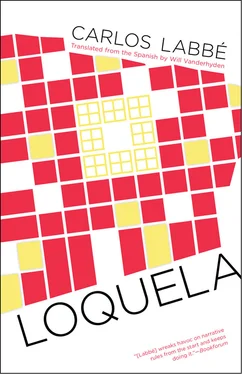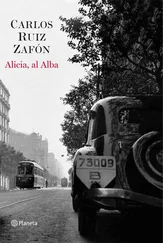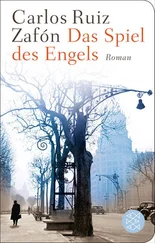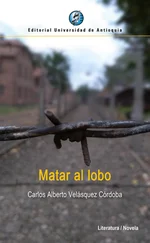Alicia changed the names when narrating certain events, when fitting them together for me, one with the other, inventing stories that made her laugh while I sat and watched the boats that went out fishing at night in the port, incessant little lights. She liked coming up with sarcastic lullabies inspired by whatever I was doing, this little light is going out, going out, going out, for The Little One who doesn’t sleep, doesn’t sleep, that’s what she sang; I listened to her from where I was leaning on the railing, contemplating the illuminated port of Neutria, working, waiting for the ring of the telephone to rupture the nocturnal silence and for it to be you on the other end of the line.
She said she preferred to adopt the indefinite voice of fairytales in her stories in order to, just for the fun of it, alter the names of those who appeared to me each day. And yet the next morning she said that she didn’t want to use real names of people, because it made her feel repulsive, repulsive words used again and again across the centuries, sullied and cleansed by each and every life, like the windows of a house clouded over by the contaminated air of its inhabitants, like the crystal glasses of a busy locale that — from years of washing — are bound to break, like my hours, like this pen, like my voice.
Alicia was talking behind me and laughed loudly again, she was fixing her hair, about to go out and swim in the ocean, to watch from afar the boy who left the university at sunset. I ignored her; I didn’t want to get worn out, I enjoyed sitting still, watching the way Neutria moved. Alicia gave him a name — He Who Is Writing the Novel — when she peered in the window of his room, which faced the street, and saw him remove a notebook from a drawer, tear out some pages, and sit down to write. I didn’t want to know that she’d seen him buy a new notebook, transcribe a few of the torn-out pages, date several sections, and, with distinct handwriting, begin to write the following: Starting today the novel will dictate my days; my days will be embodied in these pages, these pages will be embodied in me, and I’ll be embodied in an other, until this other can no longer be embodied and the novel ends. Even though I didn’t want to hear about it, that night Alicia came out to the balcony anyway, to tell me stories about how he watched me and wanted me, wanted me the way an author wants his protagonist, with a longing that demands an end, and this isn’t just a manner of speaking, silly Violeta, I’ve seen how he spends sleepless nights writing the story of an albino girl to whom something fatal happens. Then I laughed at myself.
We’d seen each other almost one year before, we were classmates in a literature course at the university. But I’m sure that we’ve met each other long before, somewhere else: a plaza in different city; you’re a little boy, you approach the edge of a fountain because a supernatural glimmer at the bottom catches your eye; you are deeply disappointed because through the water you see that it’s the light of the sun reflecting off a coin. I’m a little girl, I approach you with great curiosity because you’ve stayed in the same place for so long, but I can’t see what you’re seeing, I’m much smaller than you. You turn around, you find me on tiptoes and ask me what I’m looking for; the bottom, I say. At the bottom of the water there’s just more water, you say.
Then you go. And I believe you.
The professor of the class where we met liked to repeat that literature is a laboratory, and on one occasion someone asked him if by this he was referring to the naturalism of Zola, he concealed a mocking expression and said that we should follow the etymology: literature as a space to labor. I was left with a feeling of something missing, of malignance, by the discussion of the nature of the written — like everything that seems to have no end — and when everyone was leaving, I approached the professor to discuss this. But before I could say anything, I found the eyes of He Who Is Writing the Novel, standing beside the professor; a heavy sensuality came over me, I’m not sure if it was prompted by the professor or the student. According to Alicia, as I walked away, the professor said something in a low voice and He Who Is Writing the Novel raised a hand in my direction, leaning slightly, then lifted his other hand and pointed at me, and then, quickly, let both arms fall, unsettled by the professor’s words: That is a body. Alicia maintained that neither of them smiled, but stayed serious; the boy stared at the floor and lifted his arm for a third time to sketch the movement of my feet walking away in the air. The professor, on the other hand, looked directly into the eyes of He Who Is Writing the Novel.
The next week I lost all interest in the lights out in the port. Alicia sang: the little light has gone out, where is The Little One, find me The Little One. I lost interest in my classes at the university, too, and concentrated on the composition of my second picture. Just like how every now and then I hear footsteps approaching the door to this house and get up to look out the window, pretending to be focused on the trees moving in the wind, but actually sad not to have welcomed you with this finished letter, until I sit down again to write you, it happened then, when the voices interrupted me at the exit to the university and made me turn around to see who was saying my name. Then, just then, I was at the right distance from the façade to realize that I had discovered my second picture, the one that would at last sustain the ekphrasis: in a landscape that is purely human — I said to myself at the exit to the university — nothing will stop; but a construction that people enter and exit will be different. I believed that once I wrote about the persistence of a single building and its inhabitants, the eternity of all of Neutria would not be unthinkable.
What I’d never considered is the illusion upon which the ekphrasis is based, which came to me suddenly when at last I gave up writing the paragraphs that I was using daily to describe the façade of the Universidad de Neutria, repeating the same succession of images, the same nouns, the same verb. Actually, it was Alicia who revealed the illusion to me and planted the doubt that would again give rise to the movement of the characters, that would alter them by putting these words in their mouths as their only reflection: this action might be my last. When she came up to me complaining that she was bored of my stationary routine, asking me to at least let her read my paragraphs, she almost touched my face with hers trying to understand the smile provoked by my final lines: He Who Is Writing the Novel takes a step forward before starting down the stairs that give way to the path of smooth stones leading to the university gate; around him, the pointed arch frames the blackness of the tall entrance to campus; the stones are interlocked in a formation that is rectilinear in every way up to the metal lettering that displays the name and the year the university was founded, flanked by two gargoyles, leading to a barely discernable curve that bears toward the depths of one corridor, the wall at the back from where it descends to a basement whose classrooms hold up the edifice of thick beams and old concrete, covered by the plastic tiles that support the right foot of He Who Is Writing the Novel, who balances on the edge of the first step — while one of his hands tightens the shoulder strap of his backpack, his hair falling straight across a forehead that hasn’t a single wrinkle, the origin of the skin, the smoothness of his forehead extends across his face, twisting along the tops of his temples, reaching his neck and covering his clavicles, his arm, part of his fingers, his fingernail, not a hitch in the movement of the hand that opens, not a crease on the shirt, not a mark on the face clean as the marble that half covers the walls at the entrance — and moves toward someone on the steps who has made a false move, who is losing their balance and falling, no; he walks toward the gate with a stack of papers under his arm, copies of a magazine called Suspensión , one of its sheets still folded across his butter-colored shirt, which, in spite of the wind and the quality of the fabric, isn’t wrinkled or stained; one of his eyes slightly closed because the sun is hitting his face, the half-closed pupil stares straight ahead; I’d say that the angle of his right foot with respect to his leg is too open, exaggerated, he doesn’t seem to be walking; I’d say that his only wrinkle is the eyelid above the contracted pupil, I’d say that He Who Is Writing the Novel sees nothing as it falls.
Читать дальше












